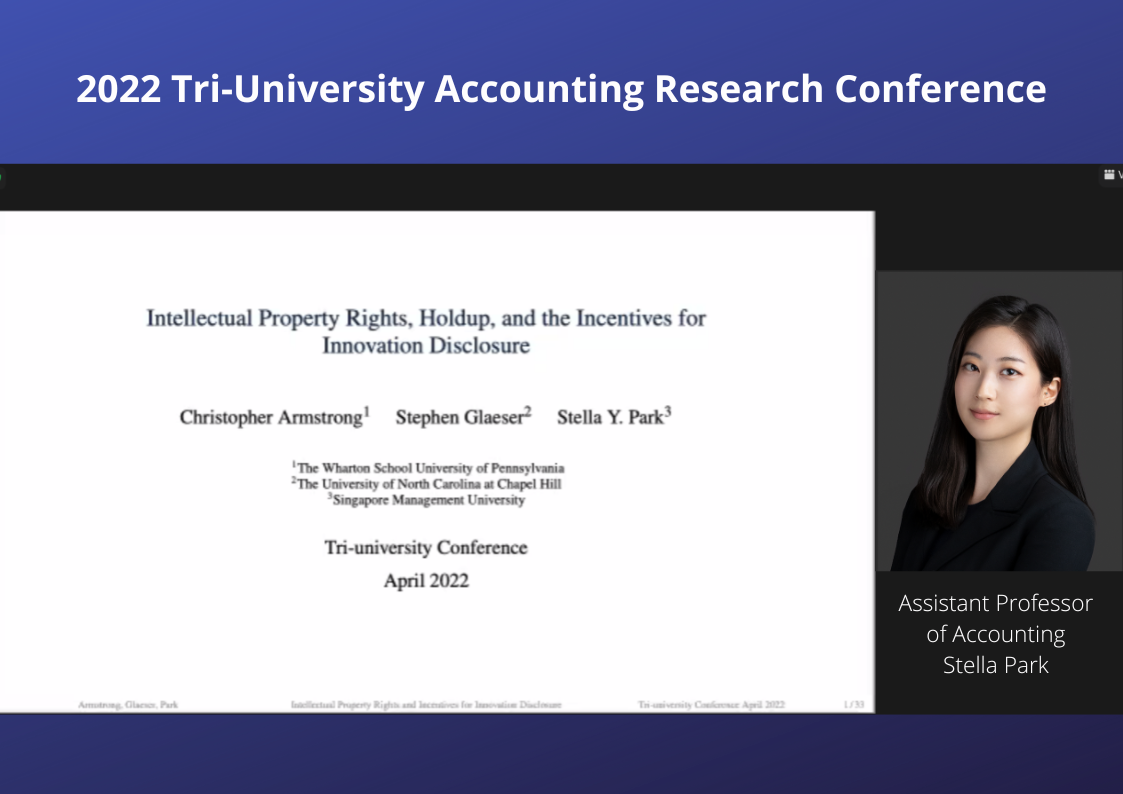
The annual Tri-University Accounting Research Conference was hosted by the National University of Singapore (NUS) on 9 April 2022. It is organised to share the research of Assistant Professors from NUS, Nanyang Technological University (NTU) and Singapore Management University (SMU), providing a platform for faculty members to discuss and share thoughts on the papers presented.
This year, Assistant Professor Stella Park from SMU's School of Accountancy presented her paper "Intellectual Property Rights, Holdup and the Incentives for Innovation Disclosures" during the conference.
Co-authored by Christopher Armstrong of The Wharton School University of Pennsylvania and Stephen Glaeser of The University of North Carolina, the paper examined how the assignment of intellectual property rights for successful innovations between inventors and their employers could influence the disclosure of said inventions, as well as inventor mobility.
After all, ownership of intellectual property (IP) rights has become integral to the operation and strategies of innovative companies worldwide. These intangible assets, often in the form of patents, software and data, are critical drivers of a company's value. Moreover, studies have shown that employee inventors contribute to approximately 80 per cent of all inventions in the US.
To prove their hypothesis, the authors examined the landmark ruling of Alcatel v. Brown.
Alcatel v. Brown: What Went Down
For the uninitiated, the case was between software developer Evan Brown from Texas and his former employer DSC Communications (subsequently acquired by Alcatel). Brown claimed to have conceived an idea for a programme to convert old code to run on modern machines in 1976 (way before he joined the company). In 1996, he asked to be released from the company's invention disclosure agreement so that he could pursue his idea away from DSC.
Herein lay the problem. Both Brown and DSC realised the programme's potential and wanted rights to it. After a year of unsuccessful negotiation, DSC fired Brown and brought a breach of contract lawsuit against him, claiming he had violated his employment agreement when he failed to disclose his idea to the company.
Eventually, the court not only ruled that Brown had indeed been unable to disclose his idea but also that the company was entitled to "full legal title and interests" of any inventions in 2002. As such, Brown was forced to hand over his idea and pay Alcatel's attorney's fees.
The authors believed that the verdict of this case is one of the leading causes why employee-inventors are hesitant to disclose their potential ideas, especially if they are working in US states where the law is being enforced. The court's ruling showed that companies could still enforce employees to turn over their IP rights for any ideas they had developed during off-work hours and even outside of their employment period.
The Importance of Innovations for A Company And The Economy
It's common knowledge that innovations are necessary for growth. In fact, studies have shown that corporate innovation is an increasingly important source of economic growth, value creation for stakeholders, and competitive advantage against other market rivals.
And to protect one's innovation, patents and patent disclosures are integral.
According to the authors, prompt disclosures can result in increased knowledge spillovers in innovation that can lead to economic and technological growth, and reduce inefficient duplication of research efforts. In addition, it can affect the allocation of resources and capital because of the information asymmetry around the innovation. Further, it can help solidify the employee's innovative abilities and credibility in the industry.
However, some firms might choose to delay patent disclosures because innovations, while necessary, can be at times a costly endeavour with companies having to invest in talent and infrastructure. According to Assoc Prof Park, this is especially so when the knowledge acquired through research is embedded in the human capital of the inventor-employees. It is also risky, as the outcomes of these inventions and innovations are often unpredictable.
At the same time, employees can also hold their companies hostage by threatening to take knowledge acquired from research done at the company to another firm or their own start-up. In short, the company's future may be at stake should employees choose to use their innovations as bargaining tools.
Thus, such developments can lead to potential delays and deterrents to patent disclosures and applications.
The Shift In Patent Disclosures
The final verdict of Alcatel v. Brown, however, seemed to have caused a shift in patent disclosures.
Through their research, the authors found that companies with inventor-employees affected by the ruling from Alcatel v. Brown were accelerating their patent disclosures. This was because it these same employees were 50 per cent less likely to change employers. Thus, with their mobility somewhat stifled, the companies were more willing to push ahead with their employees' innovations with the significant shift of IP rights from inventors to employers, as their staff were less likely to leave.
They also found that the Alcatel v. Brown ruling had little effect on patent disclosures for superstar inventors – they were already publicly recognised, and inventor-employees who've built strong relations with the company.
In short, the paper showed that disclosure is one margin of response that companies used to alleviate potential hold-ups with inventor-employees. Through this, the authors also revealed that the shift of IP rights could significantly impact the way companies manage their innovations and staff.
Ultimately, Assistant Professor Park hopes that the paper will be able to shed light on IP rights and the hold-up problem in employer-employee relationships and highlight companies' explicit and implicit labour contracts and how that can influence the information environment and disclosure policies.